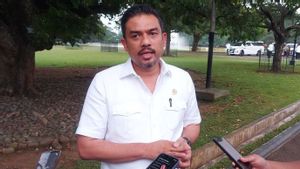JAKARTA - The Constitutional Court (MK) stated that the process of transferring the status of KPK employees through the national insight test (TWK) did not conflict with the 1945 Constitution so that it remained constitutional.
"Judging, rejecting the applicant's application in its entirety," said Chief Justice of the Constitutional Court Anwar Usman when reading the verdict at the Jakarta Constitutional Court building, quoted by Antara, Tuesday, August 31.
The decision was taken by nine Constitutional Justices, namely Anwar Usman as Chairman and concurrently member, Aswanto, Arief Hidayat, Daniel Yusmic P. Foekh, Enny Nurbaningsih, Manahan MP Sitompul, Saldi Isra, Suhartoyo, and Wahiduddin Adams, each as members.
The verdict answers the lawsuit Number 34/PUU-XIX/2021 filed by Muh Yusuf Sahide as the Executive Director of KPK Watch Indonesia.
In his petition, Yusuf Sahide asked the Constitutional Court to state that two articles in Law No. 19 of 2019 concerning the KPK contradict the 1945 Constitution.
The two articles are Article 69B paragraph (1), namely "At the time this Law comes into force, KPK investigators or investigators who have not been registered as employees of the state civil apparatus within a maximum period of 2 (two) years after this Law comes into force may be appointed as employees of the state apparatus. state civil servants as long as they comply with the provisions of the legislation.
As well as article 69C which reads "At the time this Law comes into force, KPK employees who have not been employees of the state civil apparatus within a maximum period of 2 (two) years from the time this Law comes into force may be appointed as employees of the state civil apparatus in accordance with the provisions of the regulations. legislation."
Yusuf Sahide hopes that the Constitutional Court panel will amend the two articles to "When this Law comes into force, KPK employees who have not been employees of the state civil apparatus within a maximum period of 2 (two) years from the time this Law comes into force are appointed as civil servants. state as long as it fulfills the provisions of 1. Willing to become an employee of the State Civil Apparatus (ASN), and 2. Has not entered the retirement age limit according to the provisions of the legislation".
The reason for the applicant is that the phrase "can be appointed as an employee of the state civil apparatus as long as it fulfills the provisions of the legislation" in articles 69B and 69C is used incorrectly because it uses TWK as a selection and for employees who do not pass the TWK will result in the dismissal of KPK employees, causing constitutional losses. as regulated in Article 1 paragraph (3), Article 27 paragraph (2), Article 28D paragraph (1), Article 28D paragraph (2), and Article 28D paragraph (3) of the 1945 Constitution.
However, the Constitutional Court judge rejected the arguments put forward by the applicant that the implementation of the TWK had resulted in the violation of the right to recognition, guarantee, protection and fair legal certainty.
"According to the Court, Article 28D paragraph (1) of the 1945 Constitution is not intended to guarantee that a person who has held any position cannot be dismissed on the grounds of guaranteeing and protecting legal certainty," said the judge of the Constitutional Court.
Legal certainty in question is fair legal certainty and equal treatment in the sense that every employee who experiences a status transfer has the same opportunity to become an ASN with the requirements determined by the legislation.
This means that the provisions contained in Article 69B paragraph (1) and Article 69C of Law 19/2019 apply not only to KPK employees who do not pass the TWK but also to all KPK employees.
"Therefore, according to the Court, the a quo provision does not contain discriminatory provisions. The fact that there are several KPK employees who do not pass the TWK is not a matter of the constitutionality of norms," said the judge.
Furthermore, regarding the applicant's argument which states that the TWK mechanism has also violated Article 28D paragraph (2) of the 1945 Constitution, according to the judges of the Constitutional Court it is also inappropriate because the right to work is directly related to the right to earn a living, the right to maintain life and the right to live in physical prosperity. inner.
"These rights are not only owned by a group of people, who because of certain things benefit from getting a job, but these rights are also owned by everyone without distinction," said the judge of the Constitutional Court.
The fact that certain jobs are given certain special conditions is not interpreted as an attempt to eliminate a person's right to work and to receive fair and proper remuneration and treatment in an employment relationship as guaranteed in Article 28D paragraph (2) of the 1945 Constitution.
"According to the Court, the existence of specific requirements in a job does not conflict with Article 28D paragraph (2) as long as it is carried out based on reasons and through fair, rational and legal procedures. What is prohibited by Article 28D paragraph (2) of the 1945 Constitution is if the provisions of the law The law has completely eliminated a person's right to work," said the judge of the Constitutional Court
The Court is of the opinion that the fulfillment of the right to equal opportunity in government does not negate the authority of the state to regulate and determine the conditions, especially if the equal opportunity in government involves filling public positions that require public trust.
The Constitutional Court emphasized that the design of the transfer of KPK employees to ASN has been determined by Law 5/2014 concerning ASN and its implementing regulations and one of the general measures that has been accepted as an objective measure to fulfill the requirements for filling the position is the Nationality Insight which is also a requirement when selecting ASN and during career development. PNS as regulated in Law 5/2014 and its implementing regulations.
"Therefore, according to the Court, such a requirement is inappropriate if it is considered as a provision that hinders the right of a citizen to obtain equal opportunities in government and also cannot be viewed as a provision containing discriminatory treatment," said the judge of the Constitutional Court.
However, in that decision, four Constitutional Justices namely Constitutional Justices Wahiduddin Adams, Suhartoyo, Saldi Isra and Enny Nurbaningsih had different reasons (concurring opinions).
The English, Chinese, Japanese, Arabic, and French versions are automatically generated by the AI. So there may still be inaccuracies in translating, please always see Indonesian as our main language. (system supported by DigitalSiber.id)













